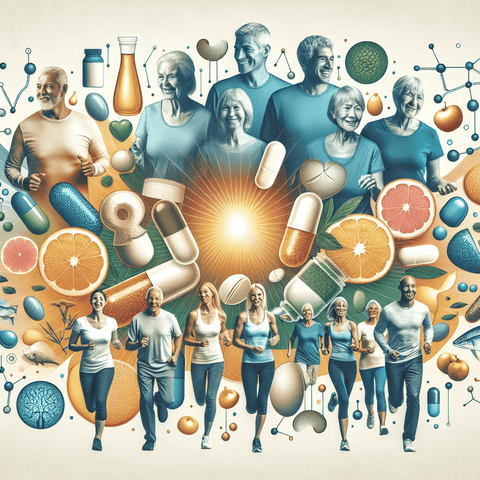Introduction
As we journey through life, our nutritional needs evolve alongside our bodies. After 50, changes in metabolism, hormone levels, nutrient absorption, and bone density underscore the need for a deliberate focus on dietary choices. While a balanced diet remains the cornerstone of optimal health, many older adults find it increasingly challenging to obtain all essential nutrients from food alone. Common hurdles—ranging from digestive limitations to decreased appetite and medication interactions—can contribute to nutrient gaps that, over time, may hinder well-being.
This is where dietary supplements come into play. Supplements serve as a practical and efficient means for individuals over 50 to bridge nutritional shortfalls, maintain energy, support immune function, promote bone and cognitive health, and foster a vibrant quality of life. But not all supplements are equally beneficial, and not everyone shares the same requirements. Selecting the right supplements, tailored to individual health goals and conditions, can foster better aging and disease prevention.
This article takes an in-depth look at the most effective dietary supplements recommended for adults over 50. You’ll discover which nutrients are most crucial at this stage in life, how they contribute to overall well-being, and where to find high-quality products that align with European health guidelines. Whether you’re concerned about bone fragility, brain fog, fatigue, or immune insufficiency—knowledge is your first defense. Read on to learn how to supplement smartly and age healthfully.
1. Dietary Supplements After 50: A Key to Maintaining Health and Vitality
As we age, the body's nutritional requirements shift due to multiple physiological changes. Nutrient absorption in the gut becomes less efficient, the body’s ability to synthesize certain compounds (like vitamin D from sunlight) declines, and hormonal changes can affect metabolism. These changes can lead to common deficiencies, particularly in key vitamins, minerals, and fatty acids, which may not be sufficiently covered by diet alone. Supplements can help fill these gaps and support overall health and vitality.
Several deficiencies frequently observed in adults over 50 include vitamin D, calcium, magnesium, vitamin B12, and omega-3 fatty acids. Low levels of these nutrients are associated with increased risks of bone loss, muscle weakness, fatigue, weakened immunity, and cognitive decline. By supplementing where needed, it becomes possible to address these concerns proactively—preventing disease rather than simply treating symptoms down the line.
Supplements are not a replacement for a healthy lifestyle but act as enhancers of it. Ideally, they should complement a diet rich in fruits, vegetables, lean proteins, whole grains, and healthy fats. For instance, omega-3s—from fatty fish or vegan algae-based options—may not be consistently consumed in sufficient quantities. In such cases, a high-quality omega-3 supplement offers a reliable source of EPA and DHA, beneficial for heart, eye, and brain health. You can explore a curated selection of omega-3 supplements here.
Moreover, as more seniors adopt plant-based or low-meat diets, they might fall short on vitamins B12 and D—both primarily found in animal foods. Likewise, medications like proton pump inhibitors or metformin can impair nutrient absorption, making supplementation necessary even for those who believe they're eating well. Ultimately, identifying these potential deficiencies through regular checkups and lab testing can inform smarter, safer supplement choices personalized to the individual.
Understanding your body’s changing needs is the first step on the road to sustainable health and vitality after 50. Working alongside a healthcare provider to determine which supplements make sense for your personal profile ensures that you’re nourishing your body with what it truly needs.
2. Aging Nutrition: Adapting Your Diet for Longevity and Well-being
Aging gracefully involves more than genetics—it requires a strategic approach to diet and nutrition that adapts to the changing needs of your body. After 50, metabolic processes slow, lean muscle mass decreases, and the ability to absorb and synthesize certain nutrients diminishes. This means the foods and nutrients that sustained you in earlier decades may no longer be sufficient for optimal health today. Aging nutrition should shift to emphasize nutrient density, easy digestibility, and protective compounds that support the body’s natural defenses against deteriorative processes.
Key nutrients that require particular focus in midlife and beyond include:
- Vitamin D: Crucial for bone strength, immune support, and muscle function. Synthesis from sunlight decreases with age, increasing the importance of dietary intake and supplementation. Explore vitamin D supplements here.
- Calcium: Vital for skeletal health and maintaining bone density—all the more pertinent in postmenopausal women and elderly men, who are at greater risk of osteoporosis.
- Magnesium: Supports energy metabolism, nervous system function, and assists with calcium absorption. Magnesium levels often decline with age. Visit our dedicated selection of magnesium supplements.
- Antioxidants (Vitamin C, E, Selenium, Polyphenols): Age is associated with increased oxidative stress. These nutrients combat cellular damage and support immune resilience. Consider checking our range of vitamin C and antioxidant-rich supplements.
Incorporating these nutrients through both foods and supplements can prevent or delay many age-related issues such as frailty, poor wound healing, cognitive decline, and compromised immunity. However, because food preferences, caloric needs, dental health, and digestive efficiency all change over the years, it’s rarely possible to meet 100% of these new requirements from diet alone.
Practical tips for incorporating supplementation into your routine:
- Time supplements with meals to improve absorption and reduce gastrointestinal discomfort.
- Choose evidence-based formulations that adhere to European Food Safety Authority (EFSA) health claims.
- Use pill organizers or digital health apps to maintain consistency and track intake.
Remember, supplements are most effective when integrated into a holistic aging nutrition plan that includes regular exercise, adequate sleep, hydration, stress management, and social engagement. For example, vitamin D supplementation is more effective when paired with weight-bearing activities that build bone strength. Nutrition after 50 isn’t just about adding more—it’s about adding smarter for longer-lasting health.
3. Senior Health Supplements: Enhancing Overall Wellness and Disease Prevention
For individuals over 50, preventive healthcare becomes particularly important. Senior health supplements provide targeted support for immune resilience, cardiovascular integrity, cognitive function, and metabolic balance. Among the top recommended supplements in this category are multivitamins, omega-3 fatty acids (especially EPA and DHA), and probiotics.
Multivitamins offer a convenient nutritional safety net by delivering a balanced mix of essential vitamins and minerals in one daily dose. For aging adults, specialized formulations exist that increase content of B12, vitamin D, calcium, and folate based on common deficiencies. These multivitamins help minimize the risk of low-grade nutrient shortages that can otherwise manifest subtly as fatigue, poor memory, or lowered immunity.
Omega-3 fatty acids from fish oil or algae-based sources offer cardiovascular protection, anti-inflammatory benefits, cognitive support, and may even reduce symptoms of arthritis. Both epidemiological data and clinical trials support their role in promoting longevity and reducing cardiovascular mortality. Look for omega-3 products with high concentrations of EPA and DHA, ideally in triglyceride form for improved bioavailability: see our omega-3 collection.
Probiotics aid digestive health, improve nutrient absorption, and support immune response—70% of the immune system resides in the gut. In seniors, both the diversity and abundance of beneficial gut microbiota tend to decrease, making supplementation with resilient strains such as Lactobacillus and Bifidobacterium helpful for maintaining gastrointestinal balance.
For disease prevention, supplementation should be tailored according to individual health status and risk profile. Someone with a family history of osteopenia or osteoporosis may benefit from additional vitamin K2 supplements to enhance calcium utilization in the bones. Individuals with cardiovascular concerns might opt for CoQ10 and omega-3s. Diabetics may need additional chromium or magnesium to support glucose metabolism, but again, individualization is key.
Before initiating any supplementation regimen, it’s highly advisable to consult with a healthcare provider. This ensures compatibility with any medications, avoids over-supplementation (yes, even vitamins can lead to toxicity when overused), and allows for dosing that aligns with lab-based nutrient assessments.
Done right, senior health supplements can uplift your well-being and add more healthy years to your life. The goal isn't merely survival but sustained wellness – where you continue to feel good, move well, and engage meaningfully in your golden years.
4. Bone Health Vitamins: Protecting Your Skeleton After 50
Bone health is one of the most critical aspects to address after 50, particularly among postmenopausal women and older men. As estrogen levels drop, so too does bone mineral density, leading to a significantly higher risk of osteoporosis and fractures. According to the International Osteoporosis Foundation, 1 in 3 women and 1 in 5 men over 50 will experience osteoporotic fractures. Preventive supplementation focusing on bone health nutrients can play a vital role in mitigating this risk.
The three cornerstones for bone support are:
- Calcium: The main structural mineral in bones. After 50, daily calcium intake should increase to meet the body's growing requirement as absorption becomes less efficient.
- Vitamin D: Facilitates calcium absorption from the gut. Without sufficient vitamin D, calcium supplementation is largely ineffective. Most individuals over 50 require supplementation due to limited sun exposure and inefficient dermal synthesis. Browse top-quality vitamin D options.
- Magnesium: Works synergistically with calcium and phosphorus in bone mineralization. Magnesium deficiency is known to impair bone formation. Visit our magnesium collection to learn more.
Another often-overlooked nutrient is vitamin K2 (menaquinone), which assists in directing calcium to the bones instead of arteries. Supplementing with K2 may improve the efficiency of bone-building and reduce vascular calcification. For those interested in enhancing their calcium utilization, explore vitamin K2 products.
Incorporate these bone-supportive nutrients into a comprehensive lifestyle strategy:
- Engage in resistance training and weight-bearing exercise to stimulate bone formation.
- Limit intake of sodium, caffeine, and alcohol which may contribute to calcium loss.
- Quit smoking—proven to deteriorate bone health.
With a strategic supplement routine and supportive lifestyle interventions, many of the risks associated with aging-related bone loss can be greatly mitigated. Prevention begins early, and proactive decision-making now ensures a more mobile, fracture-free tomorrow.
5. Cognitive Support Nutrients: Preserving Brain Function and Preventing Cognitive Decline
One of the more concerning aspects of aging is the potential for cognitive decline. Mild forgetfulness, slower reaction times, and difficulty concentrating can be a natural part of aging, but when these symptoms accelerate, they may indicate deeper issues such as dementia or Alzheimer’s disease. Fortunately, scientific research over the past two decades has uncovered several nutrients that contribute to brain health and can potentially slow or prevent cognitive impairment.
Top cognitive-supporting nutrients include:
- Omega-3 Fatty Acids (particularly DHA): DHA constitutes a large portion of brain tissue. Studies link higher DHA intake to improved memory, faster cognitive processing, and reduced brain inflammation. Find reputable supplements here.
- B-Vitamins (B6, B9 - folate, B12): These play pivotal roles in homocysteine metabolism, neurotransmitter synthesis, and myelin maintenance. Elevated homocysteine levels in blood are tied with an increased risk of cognitive decline. B-vitamin supplementation may enhance verbal fluency and memory, particularly in deficient individuals.
- Antioxidants (Vitamin E, C, Polyphenols): Oxidative stress damages brain cells and accelerates aging. Antioxidant-rich supplements combat this process by neutralizing free radicals. Consider reviewing vitamin C-based antioxidants to support brain and immune health alike.
Other supportive compounds include phosphatidylserine, acetyl-l-carnitine, alpha-lipoic acid, and gingko biloba—though it’s worth noting that more rigorous, EFSA-backed claims exist primarily for essential vitamins and fatty acids.
Cognitive health is multidimensional. In addition to supplementation, cognitive exercises (such as puzzles or learning a new language), social interaction, quality sleep, and stress reduction techniques like meditation are strongly linked to better mental performance in older age.
Early intervention is key. While supplements are not a cure for neurodegenerative diseases, they offer a proactive strategy to support brain vitality, especially when started in the preventive stages—not after functional decline has already set in.
6. Vitality Boosters After 50: Reclaiming Energy and Overall Enthusiasm
Fatigue is a common complaint among adults over 50. Reduced energy can stem from several sources: hormonal fluctuations, poor sleep habits, dietary insufficiencies, chronic stress, and underlying health issues. While lifestyle interventions—such as exercise, hydration, and stress management—are essential, certain supplements have shown promise in helping the body generate more energy and restore enthusiasm for daily life.
Coenzyme Q10 (CoQ10) is a compound naturally produced in the body and involved in mitochondrial energy production. Its levels tend to decline with age and with certain medications like statins. Supplementing with CoQ10 has been shown to improve vitality in older adults, particularly those with cardiovascular concerns.
Iron, although necessary for oxygen transport and energy, should only be supplemented in the presence of a diagnosed deficiency—too much iron can harm organs. Those experiencing unexplained tiredness should have their ferritin levels tested before resorting to iron pills.
Adaptogens, like ashwagandha, Rhodiola rosea, and ginseng, have gained popularity for supporting adrenal function and helping the body manage stress. While not universally approved by EFSA for energy claims, their traditional use and some emerging evidence show potential in reviving mental clarity and stress resilience.
To optimize the benefits of these supplements:
- Pair CoQ10 with a fat-containing meal to improve absorption.
- Only choose iron supplements after lab-confirmation of anemia.
- Cycle adaptogens to avoid tolerance and assess personal response.
Combining these targeted supplements with cardiovascular exercise (like brisk walking or swimming), mindful eating (watching glycemic load), and deep sleep hygiene can resuscitate the energy you enjoyed in earlier years. Energy isn’t a luxury—it's a necessity for vibrant living, and maintaining it after 50 is a realistic goal with the right tools in your wellness toolkit.
Conclusion
Turning 50 is a milestone—one that marks the beginning of a new chapter rather than the end of vitality. Aging gracefully requires taking proactive steps toward nutrition and overall wellness. Dietary supplements—when chosen wisely and used under proper guidance—can serve as powerful allies in this journey, bridging nutritional gaps, encouraging bone and brain resilience, enhancing immunity, and restoring lost energy.
We’ve explored essential nutrients such as vitamin D, calcium, B vitamins, omega-3 fatty acids, magnesium, antioxidants, CoQ10, and probiotics—all of which contribute meaningfully to the quality of life after 50. Personalized consultations with your physician, alongside regular lab work, ensure that your supplementation is safe, necessary, and effective.
Empower yourself with knowledge, honor your body's evolving needs, and choose high-quality supplements that support your unique health goals. Embrace this decade (and every one thereafter) with confidence, clarity, and optimal wellness—because vibrant aging is not just possible; it’s within reach.
Q&A Section
Q: Why do people over 50 need different supplements?
A: Nutrient absorption declines with age, and specific health risks (like bone loss, cognitive decline, and immune weakening) rise. Supplements can fill these nutritional gaps to support healthier aging.
Q: What are the best supplements to start with after turning 50?
A: Popular foundational supplements include vitamin D, calcium, magnesium, omega-3 fatty acids, and B-complex vitamins. A multivitamin tailored to older adults is also recommended.
Q: Can’t I just get all my nutrients from food?
A: Ideally, yes—but aging often limits appetite, digestion, and nutrient absorption. Medications can also interfere. Supplements ensure consistent intake of essential nutrients.
Q: How do I know which supplements are right for me?
A: Consult your doctor for personalized advice, consider nutrient blood level testing, and consider your lifestyle, medications, and existing health conditions before choosing your regimen.
Q: Are there risks to taking supplements?
A: Yes. Over-supplementation can cause toxicity. Always follow dosage instructions and avoid combining incompatible ingredients. Use reputable sources like Topvitamine.com for high-quality products.
Important Keywords
- supplements after 50
- senior health supplements
- bone health vitamins
- cognitive support nutrients
- vitality boosters for seniors
- best supplements for aging
- magnesium for bone support
- vitamin D for seniors
- omega-3 DHA EPA
- top supplements for men and women over 50



